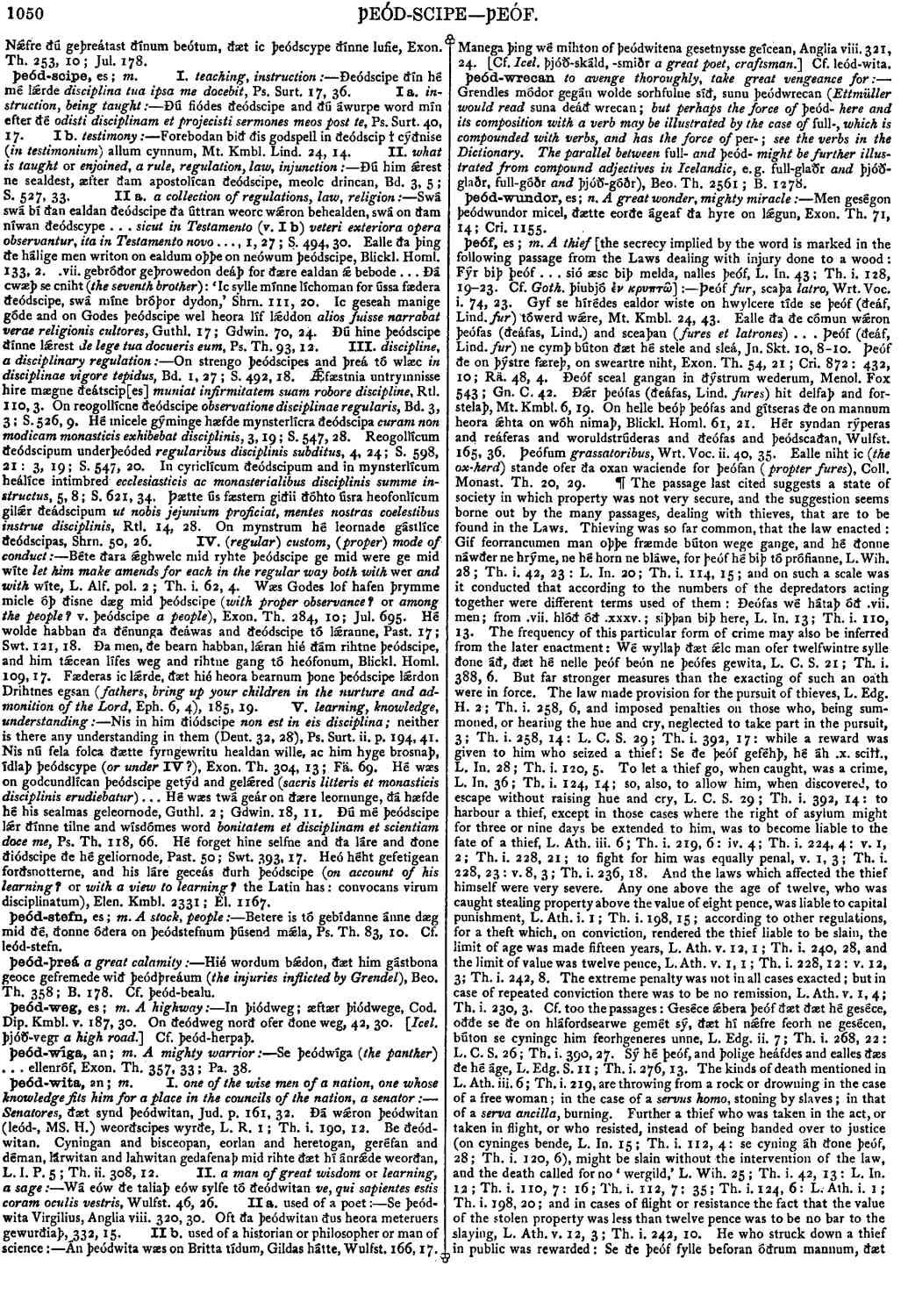þeóf
- noun [ masculine ]
- L. In. 43; Th. i. 128, 19-23.
-
Þeóf fur, scaþa
latro,
- Wrt. Voc. i. 74, 23.
-
Gyf se hírédes ealdor wiste on hwylcere tíde se þeóf (ðeáf, Lind.
fur
) tówerd wǽre,- Mt. Kmbl. 24,
43.
-
Ealle ða ðe cómun wǽron þeófas (ðeáfas, Lind.) and sceaþan (
fures et latrones) ... Þeóf (ðeáf, Lind. fur )
ne cymþ búton ðæt hé stele and sleá,- Jn. Skt. 10, 8-10.
-
Þeóf ðe on þýstre færeþ, on sweartre niht,
- Exon. Th. 54, 21; Cri. 872: 432, 10; Rä. 48, 4.
-
Ðeóf sceal gangan in ðýstrum wederum,
- Menol. Fox 543; Gn. C. 42.
-
Ðǽr þeófas (ðeáfas, Lind.
fures
) hit delfaþ and forstelaþ,- Mt.
Kmbl. 6, 19.
-
On helle beóþ þeófas and gítseras ðe on mannum heora ǽhta on wóh nimaþ,
- Blickl. Homl. 61, 21.
-
Hér syndan rýperas and reáferas and woruldstrúderas and ðeófas and þeódscaðan,
- Wulfst. 165, 36.
-
Þeófum
grassatoribus,
- Wrt. Voc. ii. 40, 35.
-
Ealle niht ic (
the ox-herd) stande ofer ða oxan waciende for þeófan (propter fures ),
- Coll. Monast. Th. 20, 29. ¶
-
The frequency of this particular form of crime may also be inferred from the later enactment: Wé wyllaþ ðæt ǽlc man ofer twelfwintre sylle ðone áð, ðæt hé nelle þeóf beón ne þeófes gewita,
- L. C. S. 21; Th. i. 388, 6.
-
But far stronger measures than the exacting of such an oath were in force. The law made provision for the pursuit of thieves,
- L. Edg. H. 2; Th. i. 258, 6,
-
To let a thief go, when caught, was a crime,
- L. In. 36; Th. i. 124, 14;
-
And the laws which affected the thief himself were very severe. Any one above the age of twelve, who was caught stealing property above the value of eight pence, was liable to capital punishment,
- L. Ath. i. 1; Th. i. 198, 15;
-
The extreme penalty was not in all cases exacted; but in case of repeated conviction there was to be no remission,
- L. Ath. v. 1, 4; Th. i. 230, 3.
-
Cf. too the passages: Geséce ǽbera þeóf ðæt ðæt hé geséce, oððe se ðe on hláfordsearwe gemét sý, ðæt hí nǽfre feorh ne gesécen, búton se cyningc him feorhgeneres unne,
- L. Edg. ii. 7; Th. i. 268, 22: L. C. S. 26; Th. i. 390, 27.
-
Sý hé þeóf, and þolige heáfdes and ealles ðæs ðe hé áge,
- L. Edg. S. 11; Th. i. 276, 13.
-
The kinds of death mentioned in L. Ath. iii. 6; Th. i. 219, are throwing from a rock or drowning in the case of a free woman; in the case of a servus homo, stoning by slaves; in that of a
serva ancilla,
burning. Further a thief who was taken in the act, or taken in flight, or who resisted, instead of being handed over to justice (on cyninges bende,- L. In. 15; Th. i. 112, 4: se cyning áh
ðone þeóf, 28; Th. i. 120, 6),
-
He who struck down a thief in public was rewarded: Se ðe þeóf fylle beforan óðrum mannum, ðæthé wǽre of úre ealra feó .xii. pæng ðe betera for ðære dǽda and ðon anginne,
- L. Ath. v. 7; Th. i. 234, 22.
-
Short of death were the punishments of selling into slavery, of imprisonment, fine, and mutilation: Gif man frigne man æt hæbbendre handa gefó, ðanne wealde se cyning þreora ánes: oþþe hine man cwelle, oþþe ofer sǽ selle, oþþe hine his wergelde álése,
- L. Wih. 26; Th. i. 42, 15.
-
Gif þeóf sié gefongen, swelte hé deáðe oþþe his líf be his were man áliése,
- L. In. 12; Th. i. 110, 8.
-
Gif man þeóf on carcerne gebringe, ðæt hé beó .xl. nihta on carcerne, and hine mon ðonne álýse út mid .cxx. sciłł.,
- L. Ath. i. 1; Th. i. 198, 21.
-
Cutting off the hand or foot of a 'cirlisc þeóf' is mentioned,
- L. In. 18; Th. i. 114, 5: 37; Th. i. 124, 20.
-
The same punishment is mentioned,
- L. C. S. 30; Th. i. 394, 10; and in aggravated cases the more severe
sentence was passed, that the eyes were to be put out, and the nose, ears, and
upper lip to be cut off, ib. An
-
If the thief managed to escape, he was declared an outlaw: Beó se þeóf útlah wið eall folc,
- L. C. S. 30; Th. i. 394, 24. v. Grmm. R. A. 635 sqq.; Schmid, A. S.
Gesetz. s. v. Diebstahl.
Bosworth, Joseph. “þeóf.” In An Anglo-Saxon Dictionary Online, edited by Thomas Northcote Toller, Christ Sean, and Ondřej Tichy. Prague: Faculty of Arts, Charles University, 2014. https://bosworthtoller.com/31714.
Checked: 0